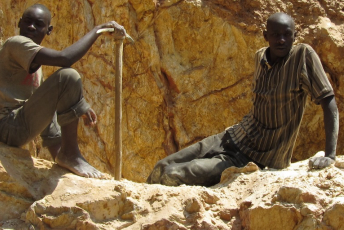In 2024, Governor Siminalayi Fubara admitted that ‘children as young as 14 and 15’ are involved in illegal oil theft and refining in Nigeria, specifically in Rivers and Bayelsa States.
Poverty, the lack of viable alternatives, and the normalisation of criminal enterprises in some communities mean children are part of the extremely hazardous illegal oil refining environment. A recent study shows that almost 90% of Bayelsa State’s population is experiencing extreme poverty, while 4.4 million people in Rivers State live in multidimensional poverty. This means that many people in these states are deprived of education and affordable healthcare.
A woman from Ondewari (a community in the Southern Ijaw Local Government Area of Bayelsa State) told ENACT that children as young as 10 were working at the illegal refineries. She said they were active participants in the illegal economy, earning money and establishing their own income streams.
Children are often involved in ‘sacking’ – when crude oil is extracted and refined illegally in makeshift facilities, and the resulting fuels (such as diesel or petrol) are poured into resilient plastic sacks, jerrycans or other containers.
These sacks aid in the transportation or concealment of the products, especially when they are being moved out of the creeks using wheelbarrows, motorcycles or small boats. Sacking a drum of petroleum product can earn children ₦5 000 to ₦15 000 (US$3 to US$9) based on local market conditions and the prevailing price of the petroleum product, the Ondewari woman said.
The process of recruiting and employing children for these activities is predominantly informal and opportunistic, relying on social networks and community ties rather than systematic coercion. Children typically volunteer or are encouraged by seeing the benefits that peers and adults derive from the trade.
Another respondent in Bayelsa State noted that the children ‘go to the camps [illegal refinery sites] of their own volition. When they get to the camps and there are areas where certain jobs are needed, they get involved. Some are engaged for sacking [bagging the products] for buyers. Some are cart pushers of petroleum products for buyers.’
Their functions also go beyond menial tasks. Some gather intelligence or are assigned as watchers and informants because of their innocent appearance. An ex-militant in Oloibiri community told ENACT anonymously: ‘We place [the children] in strategic areas, where they come to give us information. They just take small boats.
‘As they are patrolling [on the creeks] you see them as children, but you don’t know they are spies. [We] give them stipends; in fact, we know them and so we buy them over to be spies to us.
‘If they find any military vessels [speedboats] passing by, immediately they would make sounds and give us signal that such people are coming to the camp and immediately everybody would leave the camp.’
Children’s involvement in the illicit refining economy reflects not only profound socioeconomic desperation, but also highlights the complicity of the communities embedded in this criminal economy. Sophisticated, community-centred tactics of survival are used to evade state security crackdowns.
For example, organised criminal groups in Bayelsa State use women and children as human shields at illegal oil refining sites that come under attack or reconnaissance from Nigeria’s military. By deliberately placing women and children near or at refining sites, they deter security forces from raiding them. According to Bayelsa State Governor Douye Diri, ‘Occasionally, when the military is authorised to eliminate these camps and they conduct reconnaissance, they uncover that children and women are used to shield those areas.’ This results in the military withdrawing from immediate tactical actions aimed at destroying the camps.
The children recruited to work in illicit refining facilities face life-threatening conditions – including inhaling toxic fumes, or suffering from burns or respiratory illnesses, without access to medical help.
A former participant in illegal refining activities told ENACT that there was a constant danger of fire outbreaks at the camps. ‘At such times, some would get burnt. Some unlucky ones die. I was [burnt]. Mine too was serious ... my elder sister and her daughter were [also victims of fire]. My elder sister’s daughter didn’t survive it. She died. That’s how it is. She was 15 years when that incident happened – and she died.’
Nigeria’s media is full of reports of women and children killed in explosions and fires at illegal oil refineries. This includes at least 25 people in Rivers State in 2021, hundreds in a border town between Rivers and Imo State states in 2022, at least 15 in the Niger Delta in 2023, and five in Omoku in Rivers State so far in 2025.
The state and communities in Niger Delta could adopt a multi-pronged strategy to address this complex and serious problem.
A starting point would be legislation to foster deterrence. For instance, Nigeria is a signatory to both the United Nations Convention on the Rights of the Child and the African Charter on the Rights and Welfare of the Child, and is obligated to uphold the rights of all children within its jurisdiction. Niger Delta state governments should thus start by enacting laws to ban the recruitment of children into illegal refining with punitive penalties for those found guilty.
Prioritising security funding for improved surveillance in the Niger Delta creeks would contribute to dismantling illegal refining facilities and spur the arrest of illegal refiners.
Targeted funding and awareness campaigns could discourage vulnerable children’s recruitment into petroleum refining activities and encourage them to enrol in schools. This could be done together with community-centred campaigns that deter their involvement in the criminal economy.
The media, traditional institutions and religious bodies, which hold significant influence in wider society, could be part of this campaign.
Oluwole Ojewale, ENACT Central Africa Organised Crime Observatory Coordinator, ISS Dakar and Dengiyefa Angalapu, Research Analyst, Centre for Democracy and Development, Abuja Nigeria
Image: Akintunde Akinleye/Reuters







